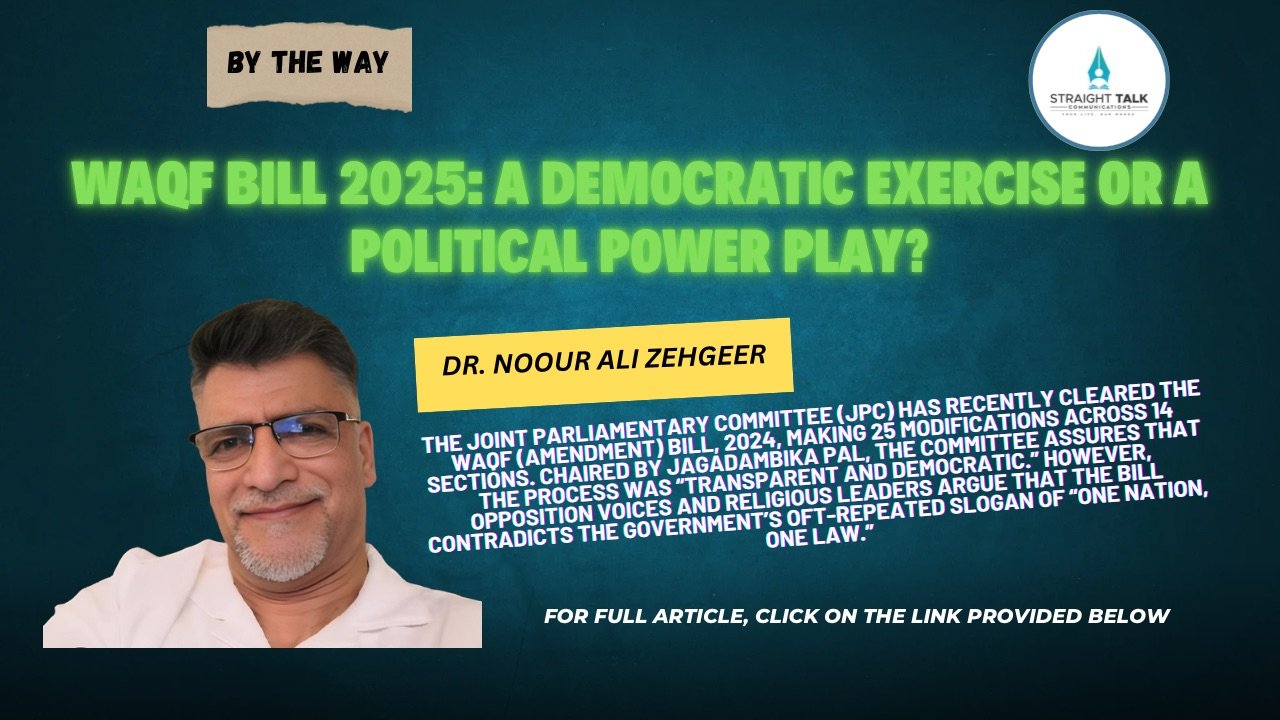Waqf Bill 2025: A Democratic Exercise or a Political Power Play?

Dr. Noour Ali Zehgeer
The Joint Parliamentary Committee (JPC) has recently cleared the Waqf (Amendment) Bill, 2024, making 25 modifications across 14 sections. Chaired by Jagadambika Pal, the committee assures that the process was “transparent and democratic.” However, opposition voices and religious leaders argue that the bill contradicts the government’s oft-repeated slogan of “one nation, one law.” So, does this amendment genuinely aim to enhance the governance of waqf properties, or is it yet another politically motivated intriguer?
The JPC’s Grand Nationwide Tour:
Pal’s statement highlights the extensive efforts taken by the JPC to consult stakeholders. “For the past six months, we have continuously visited states, be it Maharashtra, Gujarat, Tamil Nadu, Karnataka, Telangana, Odisha, Assam, West Bengal, Bihar, UP. We held 36 meetings in Delhi and consulted everyone—state government officials, waqf boards, minority commissions, Islamic scholars, professors, retired judges, lawyers, even the high courts and Supreme Court,” he said.
The JPC Chairman insists that the committee followed due process, incorporating inputs from all concerned parties. He also emphasized that every amendment was subject to voting, ensuring fairness. “We recorded the votes, and there are photographs as proof. When opposition members proposed amendments, they got 10 votes in their favour, but 16 votes went against them,” he noted. Pal’s statements underline the notion that democracy functioned as intended. However, opposition members like Kalyan Banerjee and A Raja argue that the bill was rushed through without addressing their concerns.
One Nation, Two Standards?
The amendments in the Waqf Bill have sparked debate over their alignment with the government’s “one nation, one law” philosophy. The modifications allegedly aim to curb corruption and mismanagement within waqf institutions, but they stand in contrast to similar laws governing Hindu religious trusts and endowments, such as:
Bihar Hindu Religious Trusts Act, 1950
Tamil Nadu Hindu Religious and Charitable Endowments Act, 1959
Andhra Pradesh Charitable and Hindu Religious Institutions and Endowments Act, 1987 (also applicable to Telangana)
While these laws allow Hindu religious bodies considerable autonomy, the waqf amendments appear to impose greater state control. If the goal is to ensure uniformity in managing religious endowments, why aren’t similar reforms being pushed for Hindu trusts? This discrepancy raises questions about whether the waqf amendments are a step toward efficiency or an attempt to regulate one community more than others.
Waqf: Trust or Target?
To understand the implications of the amendments, it is crucial to grasp what waqf entails. A waqf is a religious endowment, different from a trust in several ways:
- Irrevocability – Once dedicated, the property cannot be reclaimed by the donor.
- Permanence – The waqf exists indefinitely, unlike a trust, which can have a defined lifespan.
- Divine Ownership – While a trust’s assets belong to a trustee, waqf property is considered the property of God.
Waqf is a deeply embedded Islamic institution, designed for philanthropy and social welfare. Historically, Muslim rulers and individuals established waqfs to fund education, healthcare, and community services. The recent amendments, however, have triggered fears that state interference might dilute their religious and social purpose.
Mirwaiz’s Intervention: A Dismissed Plea?
Amid the heated debate, prominent Kashmiri religious leader Mirwaiz Umar Farooq, representing the Mutahida Majlis-E-Ulema (MMU), attended a JPC meeting and presented a six-point memorandum opposing the amendments. His delegation demanded:
Immediate rejection of the proposed changes
Engagement with stakeholders before implementing reforms
Safeguards for religious autonomy
Stronger protections for waqf properties
The Mirwaiz emphasized that the Muslim community should not be subjected to unilateral decisions. “We hope these concerns are respected and reflected in the final draft of the bill,” he stated.
However, given that the JPC had already passed the amendments, it is unclear whether the Mirwaiz’s plea will have any real impact or if it was simply a formality to showcase “consultation.”
The Bigger Picture: Whose Interests Are Served?
If the goal is to strengthen waqf management, why aren’t similar governance issues in Hindu religious trusts being addressed? Many see this as selective legal tinkering, an attempt to regulate one community’s institutions while leaving others untouched.
Moreover, opposition members claim the bill was bulldozed through committee discussions. While the JPC Chairman insists that voting ensured a fair outcome, critics argue that numbers alone don’t determine justice. After all, democracy isn’t just about majorities; it is also about protecting the rights of minorities.
The JPC will now finalize its 500-page report and present it to the Speaker of the Lok Sabha. Once adopted, the amendments could become law.
Final Verdict: Reform or Restriction?
The Waqf (Amendment) Bill, 2024, may indeed introduce mechanisms to curb corruption in waqf boards. But its selective application, coupled with a lack of broad-based religious reform, makes it hard to ignore the political undertones. Is this bill a genuine effort to clean up religious endowments, or is it a veiled attempt to control waqf properties while leaving Hindu religious trusts untouched? The answer, as always, depends on which side of the political spectrum you ask.
(The views are exclusively of the author and not of the Straight Talk Communications. Dr Noour has been a pioneer in the telecom industry since 1995, and has been part of different companies as COO and CEO across the globe.)







